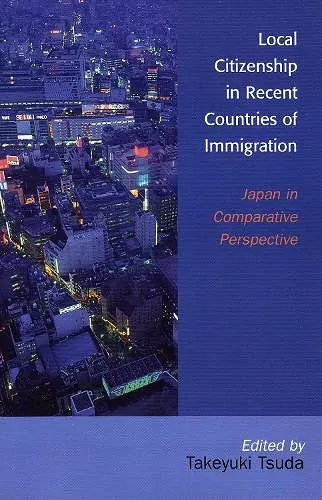Local Citizenship in Recent Countries of Immigration
Japan in Comparative Perspective
Format:Paperback
Publisher:Lexington Books
Published:22nd Mar '06
Currently unavailable, and unfortunately no date known when it will be back
This paperback is available in another edition too:
- Hardback£119.00(9780739111925)

Because of severe domestic labor shortages, Japan has recently joined the increasing number of advanced industrialized nations that have begun importing large numbers of immigrant workers since the 1980s. Although the citizenship status of foreign workers is the most precarious in such recent countries of immigration, the national governments of these countries have become increasingly preoccupied with border enforcement, forcing local municipalities and organizations to offer basic rights and social services to the foreign residents who are settling in their local communities. This book analyzes the development of local citizenship in Japan by examining the role of local governments and NGOs as well as grass-roots political and judicial activism in the expansion of immigrant rights. In this manner, localities are emerging as important sites for the struggle for immigrant citizenship and social integration, enabling foreign workers to enjoy substantive rights even in the absence of national citizenship. The possibilities and limits of such local citizenship in Japan are then compared to three other recent countries of immigration (Italy, Spain, and South Korea).
I liked the book for its innovative contrast of east Asian and south European countries. It is a valuable contribution to a growing literature that moves away from the 'nation-state' as unit of analysis. -- Christian Joppke, International University Bremen
In this well organized and referenced collection, Tsuda and colleagues provide a great service by bringing immigration politics in Japan into focus alongside other international cases and debates. Homing in on the localities and urban contexts where struggles over citizenship rights have most meaning, the authors document the work of Japanese NGOs and legal activists — and its limits — and draw illuminating parallels between Japan, South Korea, Italy and Spain. -- Adrian Favell, Centre d’études européennes de Sciences Po
The contributors should be praised for providing rich empirical accounts based on extensive field research. They offer valuable insights into the activities of and the interactions between major actors, including government officials and NGOs....Researchers of immigration and citizenship and of Japanese society should find this book highly informative. -- Chikako Kashiwazaki * Pacific Affairs, Summer 2007 *
The volume brings together prominent U.S.-based scholars who are actively working on Japan's immigration. It contributes to contemporary theories of immigration by de-linking citizenship from nation-states and introducing an innovative way to understand and theorize membership rules and entitlements through the activism of local actors....the argument in this book is exciting and innovative. -- 09/1/08 * The Journal of Japanese Studies *
Japan, South Korea, Spain and Italy, all relatively closed, low-birthrate, aging societies, are finding that they need to allow more foreigners in their midst. This innovative book is the first to compare how migrants fare in these two southern European and two East Asian countries. Not only NGOs, but also local governments are often far more accommodating to incorporating migrants into the body politic than are their national counterparts. -- Glenda Roberts, Waseda University
ISBN: 9780739111932
Dimensions: 228mm x 157mm x 24mm
Weight: 467g
312 pages